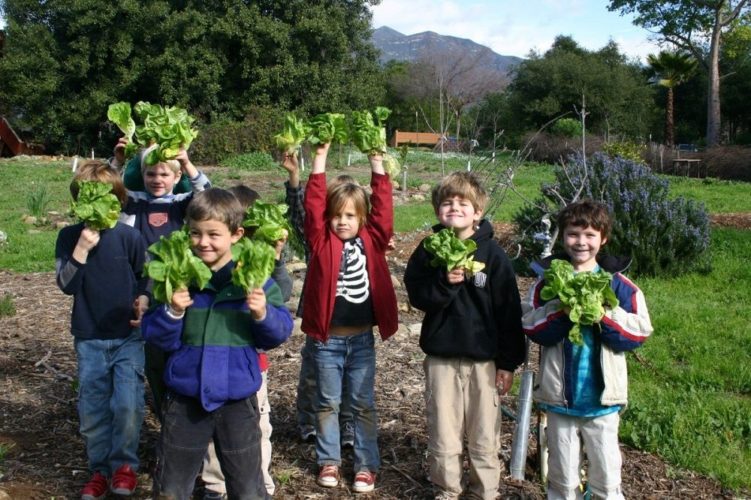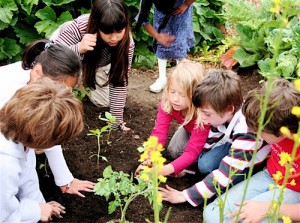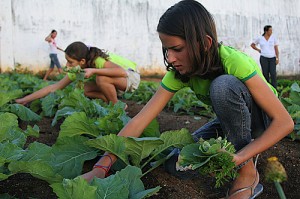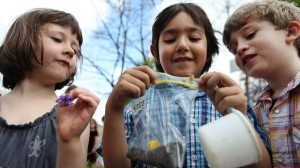School Garden Programs ‘Sprouting Up’ in Toronto and All Across the World

Students learn more than horticulture when they get their hands dirty.
Red and yellow tulips are blooming at Winchester Public School in downtown Toronto, but that’s not all that is growing there. Students are planting radishes, spinach, parsley, carrots and mouse melons, too.
Composting is the lesson for the day in this large food garden. “The worms poop and that’s how the dirt goes,” explains kindergarten student Sophie.
Kids pull dandelion plants from the ground, toss them in a wagon, and cart them over to the compost pile. They’re careful not to run over the leeks. That’s the first rule of the garden, says Sophie: ‘Don’t step on the plants.’
School gardens can helps kids learn about all sorts of things from photosynthesis to nutrition to composting. But time in the garden can benefit growing bodies as well as minds.
 Some studies have found that gardening leads to increased consumption of fruits and vegetables. Preliminary research also suggests there may be a link between gardening and healthy weight.
Some studies have found that gardening leads to increased consumption of fruits and vegetables. Preliminary research also suggests there may be a link between gardening and healthy weight.
Dr. Glenn Berall, chief of pediatrics at North York General Hospital, says many kids don’t get all the fruit and vegetables they need. Young children need four to five servings of fruit and vegetables per day, according to the Canada’s Food Guide. Teenagers need seven to eight servings.
Berall says school gardens are one way to get kids interested in healthy eating.
“I think a community garden at every school would be a wonderful idea. It develops the positive attitude for vegetables and the positive attitude for fruit potentially and helps the kids to understand where their food really comes from,” said Berall.
TABLE OF CONTENTS
Gardening, eating and exercise
Gerald Parsons, 17, is in his first year of horticulture at Bendale Business and Technical Institute, a high school in Toronto. This year, they are growing a vegetable rainbow of summer squash, hot peppers, tomatoes, purple onions, spicy mustard greens and kale.
“I just like the way nature is. How it grows and what it does. How cool it is that it provides food for others to eat and live off of it. It’s pretty awesome,” said Parsons.
Food tastes better if you know how to grow it, says Gerald Parsons. (CBC)
 Spending time with the plants has also had a positive impact on his diet. “I started eating a lot more salads,” said Parsons.
Spending time with the plants has also had a positive impact on his diet. “I started eating a lot more salads,” said Parsons.
Co-ordinator Katie German says the Bendale garden helps students see the big environmental picture.
“They’re learning about food from seed to plate. All the way, the whole process through, how much work it takes to produce good healthy food. They’re really getting a sense of pleasure and joy in that good food and they’re also seeing a really clear connection between ecological health and the health of our food.”
Gardening is an opportunity to get some exercise
“They get physical activity, physical exercise, they develop a positive relationship with food, with healthy food, and also a positive relationship with their own bodies because they are out here seeing what they’re bodies are capable of doing,” said German.
School Gardens a growing movement
 Schools around Canada are cultivating their curriculum.
Schools around Canada are cultivating their curriculum.
Lindsay Babineau works for Agriculture in the Classroom, a non-profit that has representation in almost every province. Its mandate is to spread an appreciation for agriculture at school.
She says every school wants a garden these days.
“It seems there’s a real movement right now to get the kids out from behind the screens and get their hands dirty again,” Babineau said from Abbotsford, B.C.
Babineau helps organize the Spuds in Tubs program where 6,000 kids at 200 schools in British Columbia grow and harvest potatoes before summer vacation begins.
Agriculture in the Classroom also runs Little Green Thumbs in almost 400 classrooms in Alberta, Saskatchewan, Manitoba and Newfoundland. The kids grow salad greens and cucumbers inside under lights throughout the year. “It’s as if we’re going around the circle again. We use to have school gardens and we got away from school gardens, especially when computers hit schools. It’s like, let’s get them back out there,” said Babineau.
Gardening and childhood obesity
Berall says the increased availability of fast food and less active lifestyles are contributing factors to the rise of childhood obesity.
“We need to be working at this persistently in order to make sure that the kids are getting healthier,” said Berall.
Two studies published this year looked at the potential of garden interventions to influence healthy weight.
Researchers in Utah found that community gardeners were less likely to be obese or overweight than their non-gardening neighbours. Their study found that the 198 gardeners generally had a lower BMI than both their neighbours and same sex siblings.
North Carolina researchers followed 95 school-aged children who participated in weekly gardening sessions for two years. The pilot study found that kids started eating more fruits and vegetables after they began gardening. A few of the kids who were overweight improved their BMI by the end of the study.
Future randomized control trials that consider a larger number of people across different types of communities over time may provide better insight into the connection between gardening and achieving a healthy weight.
Health aside, flavour is a sure advantage for kids who garden.
“I think it just tastes better if you know how to grow it,” said Parsons.
